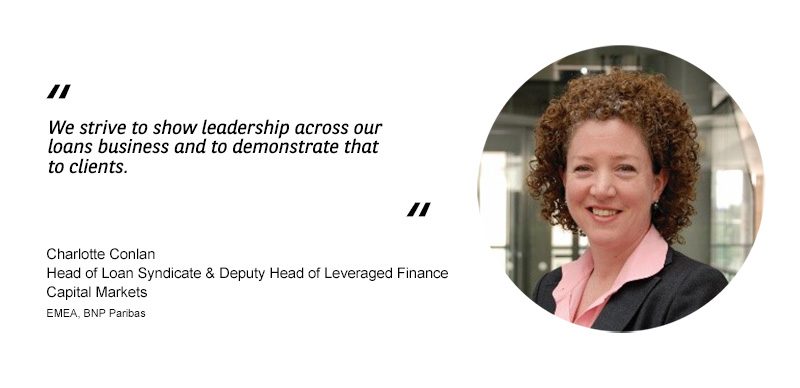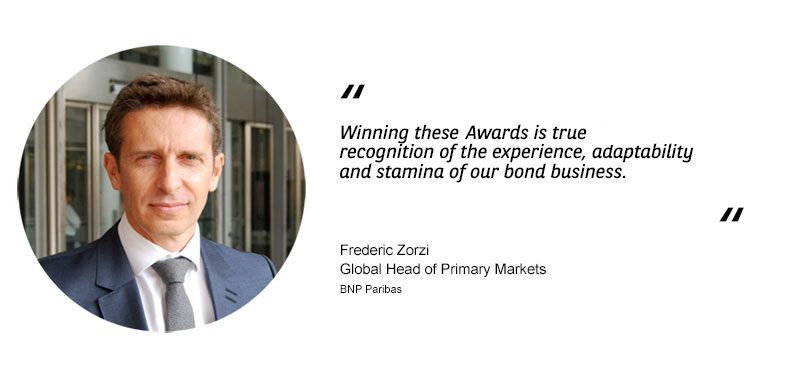Last year, 2020, proved to be one of the
most challenging years in recent times for both individuals and economies. As
the Covid-19 pandemic hit and lockdowns began, financial markets temporarily slowed
and clients across the board – from Corporates to Financial Institutions to SSA
(Sovereigns, Supranationals and Agencies) and Growth Markets issuers – were in
need to raise capital, adjust positions, extend credit lines and receive loans.
Against this backdrop, BNP Paribas was able to support the fast evolving and
diverse needs of its clients, helping them access liquidity and advise on the
right time to enter the market. BNP Paribas utilised the bank’s balance sheet, alongside
innovative thinking, to develop solutions for all its clients from investment
grade to high yield markets, demonstrating its strength as a leading European
player on a global scale.
This commitment saw BNP Paribas receive
top honours at the IFR Awards 2020, achieving a rare win for both global Bond
House and Loan House awards in the same year, as well as five other major
categories:

- Bank for Sustainable Finance
- Euro Bond House
- Europe IG Corporate Bond House
- EMEA Loan House
- ESG House Asia
“Winning these Awards is true recognition
of the experience, adaptability and stamina of our Capital Markets franchise”,
commented Frederic Zorzi, Global Head of Primary Markets at BNP Paribas. “We
knew it wouldn’t be a 100-metre sprint but a long climb, but thanks to our
seasoned team members, who have experienced many crises before, we were able to
advise clients, develop innovative solutions and, as a result, lead a huge
number of deals.”
Supporting Corporate Clients
As many companies were forced to close and economies shut down in March 2020, they found themselves in a difficult position and needing to raise capital. Many corporate issuers turned to the debt capital markets to repair their balance sheets, giving rise to two key market trends, hybrid issuance and long-dated issuance. BNP Paribas was active in both markets, including Vodafone’s return to the hybrid market since 2019 and its first issuance in 2020, with a €2bn hybrid issuance. As a result, BNP Paribas was ranked #1 in the Euro Corporate Hybrid and Euro Corporate Long-Dated League Tables in 2020, according to Dealogic.Corporates also looked to loans to raise capital throughout the crisis to ensure they had sufficient liquidity to operate. BNP Paribas provided more than 42% of all European underwritten liquidity facilities and critically on a sole basis for clients such as Saint Gobain and Siemens. Recognising when the market changes requires skill and insight illustrated by BNP Paribas’ mandate as joint global coordinator and underwriter of Masmovil’s leveraged buy-out (LBO) syndication, the first widely syndicated facility that featured an environmental, social and governance (ESG) ratchet, and which led the start of new underwritings in the post-Covid world.
BNP Paribas’ teams ensured the bank had sufficient liquidity at its disposal and used this to support corporate clients.
High-yield clients also faced similar challenges. Due to the uncertain market conditions many previously investment-grade issuers were downgraded to high-yield status. BNP Paribas’ expertise and knowledge of the investment-grade and high-yield markets allowed the bank to support both client types. For example, Rolls-Royce embarked on a £5bn rescue capitalisation in the fourth quarter of 2020, across asset classes, and BNP Paribas was a bookrunner and underwriter of its £1bn two-year term loan, the biggest underwriter on its rights issue and a global coordinator on its £2bn-equivalent bond.
Proving suitable solutions for corporate clients meant pooling expertise and resources across the Bank’s debt, equities and loan capital markets businesses into a single integrated platform. This close collaboration was a key factor in how BNP Paribas was able to support its investment-grade and high-yield corporate clients across bonds and loans throughout the pandemic.
As a result, BNP Paribas underwrote more than €50bn corporate loans in Q2 – dominating the bookrunner landscape and ranked number one for all corporate bonds in Euros for 2020, according to IFR.

“We strive to show leadership across our loans business and to demonstrate that to clients,” commented Charlotte Conlan, EMEA Head of Loan Syndicate and Deputy Head of Leveraged Finance Capital Markets at BNP Paribas. “If you are doing more deals than anybody else, you have the best insights into the market, and that allows you to provide optimal advice to clients and best execution.”
Beyond Corporates
SSA issuers, particularly sovereigns, became extremely active following the onset of the crisis. Countries looked to raise huge amounts of funds as bailout and support packages were rolled out across the world to support individuals and companies, invest in healthcare and fund the overall recovery to the pandemic. Social bonds were a natural vehicle of choice to raise these funds and issuers looked to their current social bond frameworks. This also led to the rise of Covid-19 Response Bonds which follow a similar framework to social bonds but with a specific focus on the Covid-19 pandemic. As a leader in sustainable finance, BNP Paribas was instrumental in developing Covid-19 Response Bonds and was able to advise clients throughout the pandemic.Perhaps the most significant social bond of 2020 was from the European Union – a €17bn dual-tranche offering split between €10bn of 10-year and €7bn of 20-year social bonds. This was the world’s largest social bond and largest-ever syndicated Euro deal – in which BNP Paribas was a bookrunner.
BNP Paribas’ SSA business was a top-three bookrunner in G3 currencies and number one in euros – and in 2020 the single currency accounted for about two-thirds of overall issuance.
Financial Institutions (FIG) were also in need to raise funds and felt the pressure to quickly enter the market as the crisis hit. BNP Paribas’ FIG team’s careful planning and strategic approach allowed it to advise clients on the best time to enter the market. Instead of entering the market at the height of the crisis, BNP Paribas advised clients to wait, anticipating pricing conditions would improve, which proved correct. When BNP Paribas brought its first non-secured FIG transaction to the market after the onset of Covid-19 for its own treasury on 14 April 2020, it priced the €1.25bn nine-year non-call eight non-preferred senior bond with just a 5bp premium, compared with 60bp–100bp other banks paid in the US dollar and euro markets in March 2020. BNP Paribas’ close communication with clients, teamwork and a deliberate approach to pricing, meant the Bank secured favourable pricing for its FIG clients.
BNP Paribas’ FIG team was also active on Allianz’s dual-currency RT1, the insurer’s debut in the format, which was recognised by IFR as Europe Financial Bond of the Year. Through deep investor engagement, BNP Paribas was able to set record low coupons. A €1.25bn perpetual non-call April 2031 note was priced at 2.625% and a $1.25bn perp non-call April 2026 at 3.50%.
Winning the global Loan and Bond House awards for the first time ever is testimony to the strength and expertise of BNP Paribas’ capital markets franchise as well as the resilience the Bank showed in 2020 in the face of adversity, and continues to show in 2021. The deep integration across BNP Paribas’ Capital Markets platform, which puts clients front of mind, enabled the Bank to stay closely connected to its clients throughout the pandemic and adapt quickly to their evolving needs.
“We would like to thank our clients for their continued trust in BNP Paribas and are honoured to be recognised by IFR for these awards”, commented Zorzi.


